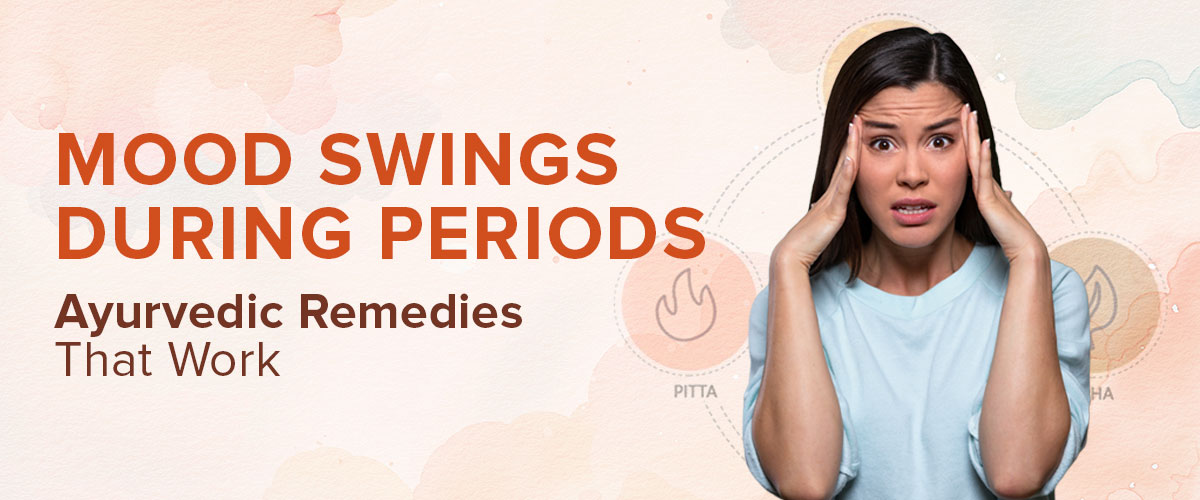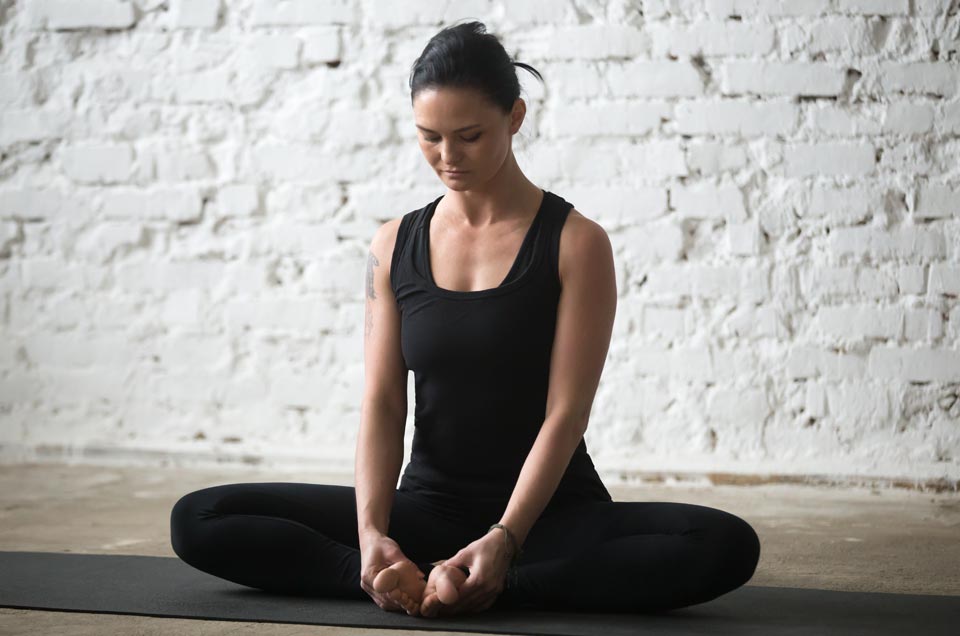Do you also wonder whether the mood swings you experience during your period are just in your head? In reality, they're a real and common experience. A study by UVA Health found that more than 64% of women experience mood swings or anxiety before their period.
These emotional highs and lows can easily impact your everyday life, relationships, and complete health. You might feel okay one minute and completely overwhelmed the next. While it's a natural part of the menstrual cycle for many, that doesn't mean you have to suffer through it without support.
Ayurveda helps to treat this health issue naturally through herbs, diet modifications and lifestyle changes. By integrating Ayurvedic methods into your everyday habits, you can considerably reduce your mood swings and improve mental stability during your menstruation period.
What Causes Mood Swings During Your Periods?
Mood swings during your menstruation cycle can show up as signs of irritability, anxiety, sadness, or violent outbursts. These emotional changes are usually associated with hormonal changes in the menstruation cycle.
When you understand the causes, patterns and triggers behind these mood changes, you can handle them in a better way.
Here are the main factors that influence mood swings:
Hormonal Fluctuations: Your estrogen & progesterone levels rise and fall during your cycle. Estrogen raises mood-enhancing neurotransmitters like serotonin. When estrogen drops, so does your mood. The soothing effect of progesterone also varies, impacting your mental stability.
Blood Sugar Levels: Hormonal changes can affect your blood sugar, causing irritability or fatigue.
Stress Response: Hormonal shifts can impact cortisol, the stress hormone, making you much more sensitive to anxiety and stress.
How Do Hormonal Changes Influence Mood?
Your hormones are like your body's internal communication system. When they are balanced, you feel really steady and energised. However, hormonal fluctuations during your menstruation cycle, particularly during the luteal stage (after ovulation and prior to your menstruation) can result in:
Increased Sensitivity: You might feel more emotional or reactive to situations that normally would not bother you.
Anxiety & Irritability: Low progesterone and estrogen levels may make you feel irritable or anxious.
Depressed Mood: Sometimes, you may even feel hopeless or sad during this stage.
What Does Ayurveda Say About Mood Swings During Periods?
As per Ayurveda, your health is linked directly to the balance of your body’s energies (doshas). When it comes to your menstrual cycle and the mood swings that come with it, Ayurveda addresses the underlying cause instead of just addressing the symptoms.
How Can Doshas Affect Menstrual Health?
Think of your doshas as weather elements inside you. Just like a storm could disrupt a calm day, imbalances in your doshas can disrupt your emotional state. These imbalances might be more apparent during your menstruation cycle, causing your mood swings.
Vata Imbalance: If your body has excessive Vata dosha, it may make you feel anxious, nervous or depressed. You might feel unusually exhausted or find it difficult to sleep.
Pitta Imbalance: An excess of Pitta dosha can make you feel overly critical or angry. You may lash out at people for no reason or you might start feeling hot inside, causing headaches or skin problems.
Ayurveda recommends various practices to help balance these doshas, such as specific diets, herbal treatments, and calming activities like yoga and meditation. Understanding and treating the dosha imbalances can create a more stable emotional state during your cycle. In the next section, we will discuss some effective Ayurvedic remedies to manage your mood swings.
Ayurvedic Remedies for Mood Swings
Ayurveda offers many herbal remedies to stabilise your mind and regulate your cycle during periods. Below, we have mentioned some of the most effective Ayurvedic herbs for mood swings and some expert tips on using them.
Ashwagandha (Withania Somnifera)
Ashwagandha is believed to have adaptogenic qualities, which means that it can reduce emotional stress and elevate your mood. It does this by controlling your stress hormones and making you more resistant to psychological or physical stress.
Pro Tip: Add ashwagandha in your everyday regimen by adding a teaspoon of ashwagandha powder in a cup of warm milk just before going to bed. This soothes your nervous system and promotes good sleep (important for balancing mood swings).
Shatavari (Asparagus Racemosus)
Shatavari is considered a woman's wellness herb because it balances female hormonal systems. It encourages reproductive health and is considered particularly good for mental disorders related to menstrual cycles and PMS.
Pro Tip: Shatavari can be taken as a powder or tablet. For getting its soothing effects, add one teaspoon of Shatavari powder in a cup of hot water and drink once daily. Start this routine a week before your period to control your mood swings.
Brahmi (Bacopa Monnieri)
Brahmi is another important herb which is known for its brain-boosting effects. It helps with emotional clarity, anxiety reduction and calms the brain, which could be useful for your mood swings.
Pro Tip: Take Brahmi capsules or Brahmi powder with your breakfast. Consistent use of Brahmi can help you keep a positive mood during your day.
Jatamansi (Nardostachys Jatamansi)
Jatamansi is a well-known natural sedative and is helpful in mood disorders including depression and anxiety which are intense during periods. Jatamansi helps by calming the mind and promoting better sleep.
Pro Tip: Blend some Jatamansi powder with honey and consume before going to bed. This encourages good sleep and can be helpful in regulating your mood swings.
Tagar (Valeriana Wallichi)
Tagar is known for its tranquilising effects and is used for insomnia and nervous unrest. It helps particularly if your mood swings are sleep related.
Pro Tip: Use Tagar in powdered form at night. Take only a small dose with warm water to prepare your body and mind for a restful night, reducing irritability and moodiness the next day.
Vacha (Acorus Calamus)
Vacha stimulates the nervous system and can help clear mental fog and alleviate the sluggishness which comes with mood swings during periods.
Pro Tip: Vacha is extremely potent so use it with extreme caution. Start with only a pinch in tea. Always consult an experienced Ayurvedic doctor before taking this herb.
Guduchi (Tinospora Cordifolia)
Guduchi has immunomodulatory and adaptogenic properties which can boost your body’s general vitality and immune system, thereby also stabilising your mood swings.
Pro Tip: For everyday usage, take Guduchi tablets or capsules as advised by your Ayurvedic doctor. For an instant effect, you can drink Guduchi tea to relax your system during stressful days of your cycle.
Haritaki (Terminalia Chebula)
Haritaki is considered the best herb for balancing the 3 doshas in Ayurveda. It's particularly helpful as a mild laxative and can help with bloating and digestive problems related to menstruation.
Pro Tip: Take Haritaki in powdered form with honey before sleeping. This helps cleanse the gastrointestinal tract and offers a grounding effect for the mind to help manage your mood.
Bhringraj (Eclipta Alba)
Bhringraj is mainly used for hair health but it also has potent liver-cleansing effects which can directly affect your hormonal balance and mood stability.
Pro Tip: Bhringraj can be prepared as a tea or juice. Bhringraj powder could be taken every morning to strengthen your liver and stabilise mood swings.
Sarpagandha (Rauwolfia Serpentina)
Sarpagandha is useful for health issues like hypertension and insomnia which can worsen mood swings. It has soothing effects on the nervous system, which make it an effective herb for stress-related mood changes.
Pro Tip: Sarpagandha must be taken under the strict direction of an Ayurvedic practitioner because of its potency. It should be taken in small doses before bed to improve sleep quality and overall mood.
Ayurvedic Therapies for Menstrual Mood Swings
Other than these Ayurvedic herbs, Ayurveda also offers several treatments which help in balancing the mind and body and are thereby suitable for menstrual mood swings. Let us take a look at these therapies :
Abhyanga (Ayurvedic massage)
Abhyanga is a full body massage using warm herbal oils, which is prescribed based on your dosha type. This therapy helps calm your nerves and alleviate emotional stress to stabilise mood swings. The light pressure and rhythmic strokes further encourage blood circulation and relaxation.
Pro Tip: Plan an Abhyanga session at least 7 days before your periods begin. This helps to preemptively control hormonal imbalances and the stress which are the cause behind mood swings.
Shirodhara
In Shirodhara, warm oil is poured on your forehead (third eye area). This is a deeply relaxing process which targets the nervous system, helping to calm and reset your emotional state.
Pro Tip: Shirodhara is especially helpful if you have anxiety or insomnia and mood swings. Try to have a session during your period to deeply relax your mind and ease emotional fluctuations.
Swedana (Herbal Steam Bath)
Swedana involves sitting in a steam box or room as herb-infused steam covers your body. This Ayurvedic therapy detoxifies the body and helps to balance your hormones by promoting the elimination of toxins through sweat.
Pro Tip: Use Swedana therapy after Abhyanga massage. This combination promotes better relaxation and detoxification and can make you feel lighter and more balanced emotionally.
Lifestyle & Dietary Changes to Control Mood Swings
What Daily Practices Can Help Reduce Mood Swings?
For women who wish to control their mood swings from the comfort of their own home, there are simple everyday practices that can reduce the severity of your mood swings. First, regular exercise, such as walking or yoga, can lift your spirits and stabilise your mood by releasing endorphins (body's natural feel-good chemicals). Also, practicing mindfulness or meditation for even a few minutes each day can help you remain centered and balanced emotionally.
Pro Tip: Try starting your day with meditation followed by some form of physical activity. This routine not only energises you for the day but also keeps mood fluctuations under control.
How Can Dietary Changes Help Stabilise Mood During Periods?
What you eat directly impacts how you feel. Make sure you consume a healthy diet rich in whole foods which can stabilise your mood and blood sugar during your periods. Include plenty of fruits and vegetables, whole grains and protein into your diet. Foods loaded with omega 3 essential fatty acids like flaxseeds and walnuts can improve your mood and reduce symptoms of depression.
Pro Tip: Caffeine and sugar are a major energy-boosting drug that can spike your energy levels and crash soon after, worsening mood swings. Instead, using herbal teas like chamomile or peppermint can be helpful during mood swings.
How Does Sleep Influence Menstrual Mood Swings?
Sleep is very important for mood management. If you are sleep deprived, this could increase stress and irritability, making mood swings worse. Get at least 7-8 hours of quality sleep every night, particularly during your periods.
Pro Tip: Start a bedtime routine which includes reading a book, a hot bath, or mild yoga stretches to relax before you go to bed.
Breathing Exercises & Yoga Poses to Support Menstrual Health
Breathing exercises like deep abdominal breathing can ease stress and control emotional highs and lows. Other than these exercises, try yoga, including poses like Child's Pose and Cat-Cow Pose, as it can help relieve tension and promote balance.
Pro Tip: Yoga and meditation can help you remain healthy longer. Focus on yoga asanas that can loosen up and tone up the pelvic area (like butterfly pose and bridge pose), as these are particularly helpful during your periods.
Pro Tips for Coping with Mood Swings: Quick Recipes
If you are going through tough patches during your periods, certain Ayurvedic recipes can offer comfort and help stabilise your mood. Here are a couple of quick and simple recipes that you can whip up:
Turmeric Milk
Turmeric has anti-inflammatory properties and can help calm your mood. To make this, heat a glass of milk and stir in a teaspoon of turmeric powder with a touch of black pepper and a little honey to taste. This golden milk is not only comforting but it also stabilises your mood swings.
Pro Tip: Drink turmeric milk before going to bed. It helps you sleep better and works during the night to balance your mood.
Cumin Coriander Fennel Tea (CCF Tea)
This detoxifying tea aids in digestion, which is linked with your emotional wellness. Boil 1 teaspoon each of cumin, fennel and coriander seeds in 600 ml of water until it's reduced by half. Strain and sip the warm tea throughout the day.
Pro Tip: Make a fresh batch of CCF tea in the morning and carry it in a thermos. Drink it warm throughout the day to keep your digestive system calm and your mood balanced.
Final Thoughts
By now, you must have understood that Ayurveda does not only help to balance your mood during periods but also promotes deeper harmony between your body and mind. As you include these natural remedies, consume a balanced diet and make necessary lifestyle adjustments, you can make your periods almost as comfortable as your normal days.
If you are looking for expert Ayurvedic guidance for your health needs, speak directly with our certified Jiva doctors. Call us on 0129-4264323.
FAQs
How to treat mood swings in your menstruation?
By including a balanced diet, regular exercise, and stress management methods like meditation and yoga, you can manage your mood swings better during your period.
What helps anger during periods?
Try breathing exercises, walking or practicing mindfulness meditation to calm anger during your periods. Consuming herbal teas like chamomile can also calm the mind and reduce irritability.
How to treat mood swings in Ayurveda?
Ayurveda treats mood swings by balancing the body's doshas through herbal medicines like Ashwagandha and Shatavari, dietary modifications and therapies like Abhyanga massage and Shirodhara.
What are some natural remedies for menstrual mood swings?
Herbal cures for menstrual mood swings include herbs like Ashwagandha, Jatamansi and lifestyle modifications like regular physical activity and a diet rich in omega 3 fatty acids and vitamin B.
How to regulate periods using Ayurveda?
Ayurveda suggests regulating periods with a dosha-balancing diet plan, using natural herbs like Guduchi and Shatavari, and frequently practicing meditation and yoga to alleviate emotional stress and maintain hormonal balance.
What can I drink to regulate my period?
Consume cinnamon tea, ginger tea or aloe vera juice to help regulate your cycle. These are anti-inflammatory drinks that can balance your hormones and ease menstrual pain.
What not to eat during periods in Ayurveda?
During periods, Ayurveda suggests avoiding cold and dry foods like raw salads, chocolate and caffeine. These foods can upset your Vata dosha and cause discomfort and mood changes. Instead, choose warm and cooked meals in your diet.
Is triphala good for periods?
Yes, Triphala can be helpful during periods. It helps to detoxify and cleanse the body, balances your body’s doshas and improves digestion which can indirectly relieve menstrual symptoms such as bloating and mood swings.























































